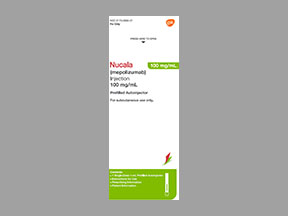
Nucala Coupons & Savings Card – Discount Prices from $4004.04
My prescription
Edit
1ML of 100MG/ML, Nucala (1 Pen)
Select pharmacy

Walmart
$4004.04
COUPON PRICE
Walgreens
$4004.80
COUPON PRICE
Albertsons
$4126.19
COUPON PRICENucala savings card
Show this card to your pharmacist
Walmart
$4004.04
BIN
ID
PCN
GRP
019876
LHC62EE190
CHIPPO
LHX
Powered by
Related interleukin antagonists prescriptions
More prescriptions for asthma
Related interleukin antagonists prescriptions
More prescriptions for asthma
Price history for Nucala
1 Pen, 1ML of 100MG/ML
Average retail price for Nucala
Average SaveHealth price for Nucala
Our price history data is based on aggregated prescription data collected from participating pharmacies in America. Our prescription data updates daily to reflect the latest price changes. If you notice a missing data point, it means there wasn't sufficient data available to generate a monetary value for that date.
*Retail prices are based on pharmacy claims data, and may not be accurate when we don't have enough claims.
Nucala dosage forms
Dosage Quantity Price from Per unit 1ML of 100MG/ML 1 Pen $4004.04 $4004.04 1ML of 100MG/ML 2 Pens $8008.08 $4004.04 1ML of 100MG/ML 3 Pens $12012.13 $4004.04
| Dosage | Quantity | Price from | Per unit |
|---|---|---|---|
| 1ML of 100MG/ML | 1 Pen | $4004.04 | $4004.04 |
| 1ML of 100MG/ML | 2 Pens | $8008.08 | $4004.04 |
| 1ML of 100MG/ML | 3 Pens | $12012.13 | $4004.04 |
What exactly does NUCALA do?
NUCALA (mepolizumab) is a monoclonal antibody that targets and inhibits interleukin-5 (IL-5), a protein involved in the growth and survival of eosinophils, which are a type of white blood cell. By reducing the levels of eosinophils, NUCALA helps manage conditions characterized by high eosinophil counts, such as severe eosinophilic asthma, eosinophilic granulomatosis with polyangiitis (EGPA), and hypereosinophilic syndrome (HES). It is used as an add-on maintenance treatment to help control symptoms and reduce the frequency of exacerbations in these conditions.
How much does a NUCALA shot cost?
The cost of a NUCALA (mepolizumab) injection can vary depending on factors such as location, insurance coverage, and the pharmacy or healthcare provider. On average, the price without insurance can range from $3,000 to $5,000 per injection. Patients are advised to check with their insurance provider for coverage details and potential out-of-pocket costs. Additionally, there may be patient assistance programs available to help reduce the cost.
Does NUCALA cause weight gain?
Weight gain is not commonly reported as a side effect of NUCALA (mepolizumab). However, individual reactions to medications can vary. If there are concerns about weight changes while taking NUCALA, it is advisable to consult with a healthcare provider for personalized advice and evaluation.
What is the difference between NUCALA and Dupixent?
NUCALA (mepolizumab) and Dupixent (dupilumab) are both biologic medications used to treat different conditions, although there is some overlap. NUCALA is primarily used for severe eosinophilic asthma and other eosinophilic conditions, working by targeting interleukin-5 (IL-5) to reduce eosinophil levels. Dupixent, on the other hand, is used for moderate-to-severe atopic dermatitis, asthma, and chronic rhinosinusitis with nasal polyposis. It targets interleukin-4 (IL-4) and interleukin-13 (IL-13) pathways to reduce inflammation. The choice between them depends on the specific condition being treated and the patient's medical history.
How do you know if Nucala is working?
The effectiveness of Nucala can be assessed by monitoring the patient's symptoms and overall health. If Nucala is working, the patient may experience a reduction in the frequency and severity of asthma attacks, improved lung function, and a decrease in the need for oral corticosteroids. Additionally, the patient might notice an improvement in their ability to perform daily activities without experiencing asthma-related symptoms. Regular follow-up appointments with a healthcare provider are essential to evaluate the treatment's effectiveness and make any necessary adjustments.
